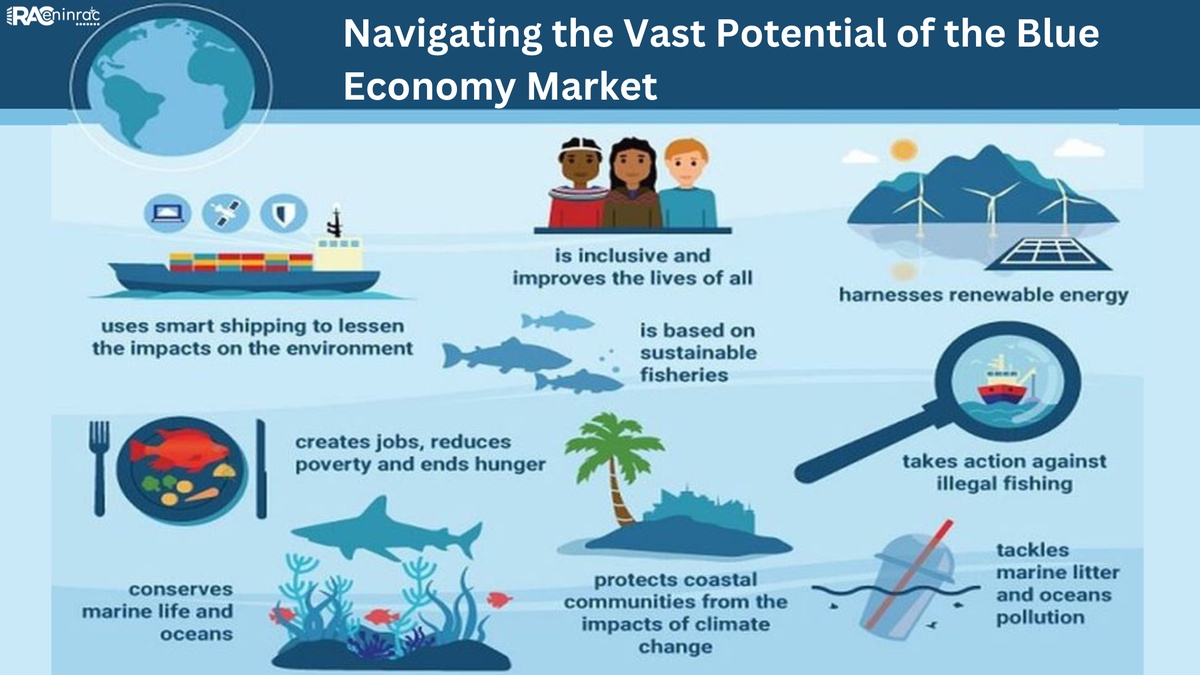In recent years, the concept of the blue economy has gained significant traction as a sustainable approach to harnessing the economic potential of the world's oceans, seas, and coastal areas. As concerns about environmental degradation and resource depletion continue to mount, the blue economy market presents a promising framework for balancing economic growth with environmental conservation. In this blog post, we will delve into the intricacies of the blue economy market, exploring its principles, current trends, and future prospects.
Understanding the Blue Economy
At its core, the blue economy is founded on the principle of harnessing the economic potential of marine resources while ensuring the sustainability and health of ocean ecosystems. Unlike traditional models of ocean exploitation, which often prioritize short-term gains at the expense of long-term environmental degradation, the blue economy seeks to foster sustainable development that benefits both human communities and marine ecosystems.
Key Components of the Blue Economy
The blue economy encompasses a wide range of sectors and activities, including:
Fisheries and Aquaculture: Sustainable management of fisheries and aquaculture operations is essential for maintaining healthy fish stocks and supporting coastal communities that rely on these resources for their livelihoods.
Marine Renewable Energy: Harnessing the power of the ocean's tides, waves, and currents offers significant potential for generating clean and renewable energy.
Tourism and Recreation: Coastal tourism and recreational activities, such as diving, snorkeling, and whale watching, contribute to local economies while raising awareness about the value of marine ecosystems.
Marine Biotechnology: The study and commercialization of marine-derived compounds and organisms for pharmaceuticals, cosmetics, and other applications hold promise for both scientific discovery and economic development.
Ocean Transportation and Logistics: Efficient and sustainable maritime transport plays a vital role in global trade and commerce, connecting markets and facilitating economic growth.
Current Trends in the Blue Economy Market
In recent years, several trends have emerged within the blue economy market, reflecting both the growing demand for marine resources and the increasing recognition of the need for sustainable practices:
Expansion of Marine Protected Areas (MPAs): Governments and international organizations are increasingly establishing MPAs to conserve marine biodiversity, protect critical habitats, and promote sustainable fisheries management.
Technological Innovation: Advances in technology, such as remote sensing, autonomous vehicles, and satellite monitoring, are revolutionizing our ability to understand and manage marine ecosystems effectively.
Corporate Sustainability Initiatives: Many companies are adopting sustainable practices and incorporating environmental considerations into their business strategies in response to consumer demand and regulatory pressure.
Investment in Blue Economy Projects: Governments, private investors, and philanthropic organizations are increasingly investing in blue economy projects that promote sustainable development and conservation goals.
Collaboration and Partnerships: Collaboration among governments, NGOs, academia, and the private sector is essential for addressing the complex challenges facing the blue economy and unlocking its full potential.
Challenges and Opportunities
While the blue economy holds immense promise, it also faces significant challenges, including overfishing, habitat destruction, pollution, and the impacts of climate change. Addressing these challenges will require concerted efforts at the local, national, and international levels, as well as innovative solutions that balance economic development with environmental conservation.
At the same time, the blue economy presents numerous opportunities for innovation, job creation, and economic growth. By harnessing the power of technology, fostering sustainable practices, and promoting collaboration and partnerships, we can unlock the full potential of the blue economy and build a more prosperous and sustainable future for generations to come.
Conclusion
In conclusion, the blue economy represents a holistic approach to harnessing the economic potential of the world's oceans while ensuring the long-term health and sustainability of marine ecosystems. By embracing sustainable practices, investing in innovation, and fostering collaboration, we can unlock new opportunities for economic growth while safeguarding the planet's most valuable resource. As we navigate the complexities of the blue economy market, let us strive to build a future where human prosperity and environmental conservation go hand in hand.
More market research, advisory consulting services to discover
At Eninrac, we offer a wide range of, advisory consulting solutions, from We put ‘search’ in research to help expand your business with ease. Discover all the possibilities now.


No comments yet